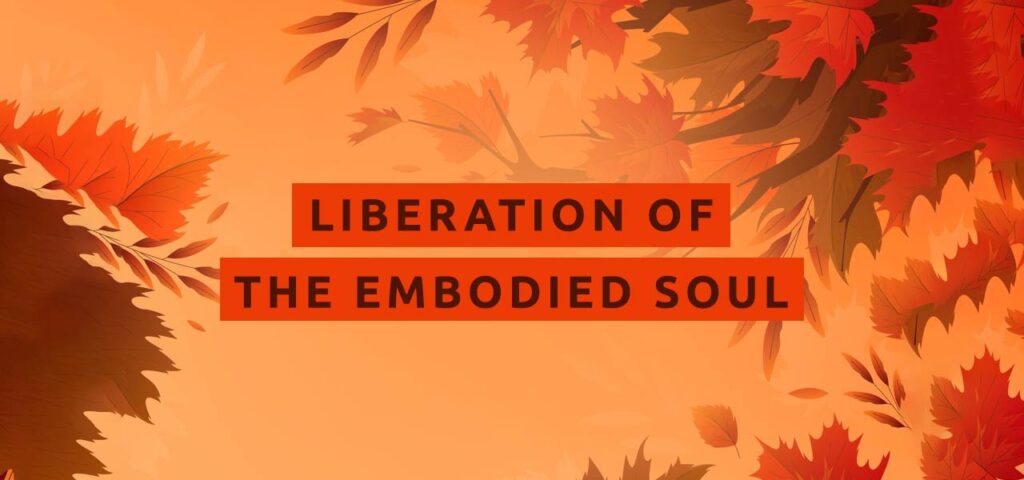Ultimate purpose of any spiritual discipline is escape of beings from suffering. Bhagavad Gita has analysed precisely as to why do the sufferings arise and how can these be alleviated.
In shloka 15.9, it is stated that while dwelling in the body, jivatman enjoys different objects of the senses using the five senses and also the mind. The three modes (gunas) which are born of material nature, bind the imperishable embodied soul to the body (Shloka 14.5).
When jivatman starts identifying himself with his body and the mind, he forgets his own eternal existence. The self is lost in a false identification with the non-self. He starts living for the satisfaction of his own ego. He is, thus, bound by the three modes of material nature. Such bondage becomes the reason for his sufferings in the physical world. To gain one’s spiritual freedom, one has to rise above these gunas.
It is stated in shloka 14.20 that when the embodied soul rises above these three modes associated with the body, he then becomes free from birth, death, old age and all kinds of pain ; and attains to the immortality.
The one who is happy from within, whose contentment is from within, who is illumined by the inner light, whose sins have been washed away, whose doubts have been cleared, whose mind is disciplined, who works for the welfare of all, who is free from anger and lust, who has subdued his mind ; and who has knowledge of the self – such a sage is sure to attain the absolute freedom (Shlokas 5.24 to 5.26).
Equanimity of mind is considered to be essential for liberation of the soul. It has been stated in shloka 2.51 that the wise men possessing an equipoised mind free themselves from the bondage of repeated births by renouncing the fruits of their actions. In this manner, they attain that blissful state, which is beyond any sorrow.
In various other shlokas, it has been explained as to how man, the subject, can gain freedom from enslavement of the objective world. Freedom from bondage of works can be gained by performing one’s prescribed duty without attachment, by being content with whatever comes one’s way, by getting beyond dualities of pleasure and pain, by being free from envy, by removing all the doubts through wisdom ; and by remaining the same in success and failure.
Whatever one does, it should be done as an offering to Krishna, the Supreme Lord. In this manner, one is freed from the bondage of good and bad results of actions. And by establishing one’s mind on the way of renunciation, one becomes free and attains the Supreme Lord (Shlokas 9.27 and 9.28).
Regarding the path of bhakti, it has been stated that he who constantly remembers Krishna, the Supreme Lord, thinking of no one else – such a yogi who is ever united with Him, can easily reach Him. Having reached Him, such a great soul does not take birth again in this impermanent world, full of miseries (Shlokas 8.14 and 8.15).
Those who fix their mind upon Krishna, let their buddhi dwell in Him ; certainly reside in Him. To those devotees who are ever united with Him through devotion and who worship Him with love, He grants such power of understanding by which they go to Him. He who knows in reality the divinity behind His birth and works, is not born again. Instead, he goes to Him (Shlokas 12.8, 10.10 and 4.9).
One should always focus his mind on Krishna, the Supreme Lord, pay obeisance to Him, be devoted to Him ; and worship Him. Thus absorbed in Him and having Him as one’s goal, one shall go to Him (Shloka 9.34).
Whatever state of being, at the end, one thinks while giving up his body ; he attains that state because he always remains absorbed in contemplation thereof (Shloka 8.6). Therefore, it has been advised in shloka 8.5 that at the time of death, one should think of Krishna alone. In this manner, one attains liberation.
Lust, anger and greed are stated to be the three gates of hell. He who is freed from these gates of darkness attains to the supreme destination (Shlokas 16.21 and 16.22).
Apart from these, Gita has also stressed upon meditation and pranayma for liberation of the soul.
All the teachings of Gita have been summarised in shloka 11.55 wherein it is stated that he who dedicates all his actions to Krishna, the Supreme Lord, who looks upon Him as his supreme goal, who worships Him, who is free from attachment ; and who is free from enmity to any of the creatures – such a devotee certainly attains Him. In other words, he is always spiritually free.
In short, when one understands that the soul is different from the body and the mind and also realises that only the modes of material nature, and not the soul, are the doer ; he then performs his prescribed duty without any attachment and remains devoted to the Supreme Lord. As a result, he is freed from sorrows of the phenomenal world. He obtains complete self-awareness and, thus, becomes master of his life. When one obtains such wisdom, he arrives at a perfect harmony with his fellow beings. He is full of compassion and love.
That is what is called liberation of the soul, a state of inexhaustible bliss.

